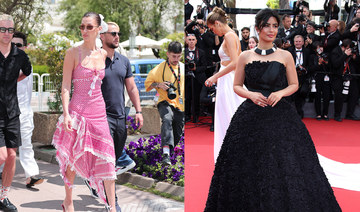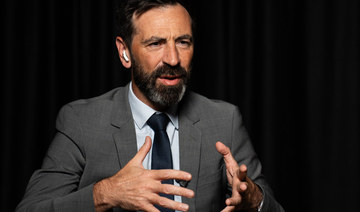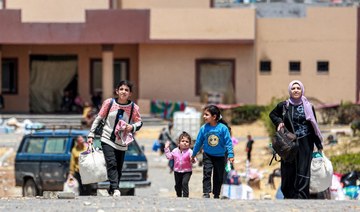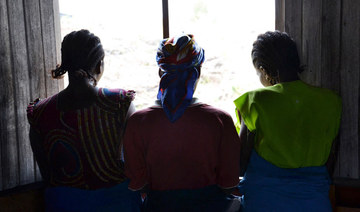ANKARA: The trial of 17 journalists and managers of leading Turkish opposition newspaper Cumhuriyet began Monday on Turkey’s Press Freedom Day.
A large crowd outside the courthouse in Istanbul released balloons to express hope for the release of those on trial, accused of helping the illegal Gulen network — which is believed to have masterminded last year’s failed coup attempt — and the outlawed Kurdistan Workers’ Party (PKK).
The trial will continue throughout this week, and if the suspects are found guilty of aiding terrorist organizations and of espionage, they could face sentences of up to 43 years in jail.
The charges against Cumhuriyet include publishing “violent and divisive news” and “interviewing leaders of terrorist organizations.”
The historic trial is being watched by press freedom activists, observers and journalists worldwide.
Ten of the journalists have been in pre-trial detention for about nine months. On the first day of the trial, Kadri Gursel — editorial adviser at Cumhuriyet and board member at the International Press Institute — told the court that the trial is mainly political.
He rejected claims that he was in constant contact with members of the Gulen movement, saying he had warned the government about the wrongdoings of Gulenists within the state apparatus.
“I believe the reason those people tried getting in contact with me at that time was because I’m an independent and critical journalist,” Gursel said, adding that their attempts to get his support failed.
“Journalists are curious people and they can have contact with anyone. The duty of a journalist who takes his or her job seriously is to broaden and diversify his or her perceptions about important issues in the country, and to then provide to the readers a healthy, holistic and sound perspective. This is called journalism, and journalism isn’t a crime.”
The newspaper’s Chief Executive Akin Atalay said “the aim of the trial is to silence Cumhuriyet or seize it,” and it shows “other journalists what will happen if they write what the government doesn’t like.”
On the first anniversary of the failed coup attempt, Turkey is witnessing a massive crackdown, especially in the media sector, with about 150 outlets shut down and some 165 journalists imprisoned. The country’s state of emergency was recently extended.
But earlier this month, President Recep Tayyip Erdogan told the BBC that “no one is jailed because of journalism” in Turkey.
He said two journalists have been tried due to their criminal and terrorist activities, not their writing.
Ozgur Unluhisarcikli, Ankara office director of the German Marshall Fund of the United States, said the Cumhuriyet case is very important because to many in Turkey and worldwide, it has become emblematic of press freedom in the country.
“The fact that several prominent journalists have been kept in pre-trial detention for eight months is problematical in itself, but it’s very important that the case proceeds in a way that won’t further create a sense of injustice in Turkish society,” Unluhisarcikli told Arab News. “In this regard, it’s important that none of the journalists are kept in detention unless there’s substantial and real evidence against them.”
The trial, considered a litmus test for press freedom in Turkey, is expected to reach an interim decision on Friday, but the trial itself may last several months.
Kader Sevinc, representative to the EU of the main opposition Republican People’s Party (CHP), told Arab News that the case is “highly symbolic.”
She added: “Today’s picture of Turkish democracy is a painful one, and the EU isn’t blameless. The decline of the EU’s soft power has had damaging reverberations in Turkey.
“Cumhuriyet is one of the few resisting media outlets. That’s why they’re on trial. This case isn’t only about criminalizing journalism but also Turkey’s republican, secular past and suppressing … free minds. History will judge the EU by its … engagement and sincere actions today, not by weakly worded press statements from Brussels and other capitals about a country that’s the biggest jailer in the world and where there’s no free press anymore.
“European decision-makers should understand that if there’s a fire in Turkey, there can be no peace in Europe.”
Newspaper trial seen as litmus test for press freedom in Turkey
Newspaper trial seen as litmus test for press freedom in Turkey
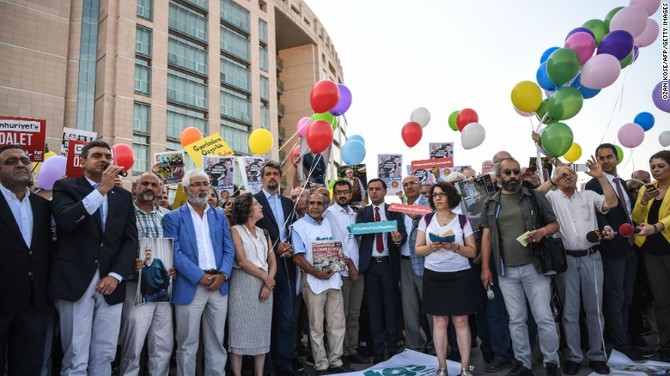
Vanity Fair France apologizes for removing Palestinian pin from image of Guy Pearce at Cannes

- Magazine faced backlash on social media for appeared attempt to censor pro-Palestinian solidarity
LONDON: Vanity Fair France was forced to issue an apology for digitally removing a Palestinian pin worn by actor Guy Pearce at the Cannes Film Festival.
On May 21, Vanity Fair published an article featuring several photographs of celebrities attending the festival. Among these was a portrait of Pearce wearing a black Yves Saint Laurent tuxedo.
Social media users quickly noticed that a pin of the Palestinian flag seen on his left lapel in other images had been removed.
Journalist Ahmed Hathout was one of the first to highlight the alteration, tweeting: “So Guy Pearce showed solidarity with Palestine at Cannes by wearing a pin and Vanity Fair decided to photoshop it out. Little did they know the bracelet was also of the Palestinian flag colors.”
The French subsidiary of the American magazine faced significant backlash on social media for what appeared to be an attempt to censor pro-Palestinian solidarity.
One user, @DarkSkyLady, tweeted: “Can we finally admit many of these outlets are propaganda-mouthpieces for colonialism and white supremacy?”
Another user, @Joey_Oey89, commented: “Reminder to unfollow and mute Vanity Fair. They smear celebs who take a stand against genocide and have made their stance clear.”
Responding to the criticism, Vanity Fair France posted an apology under Hathout’s tweet: “Good evening. We mistakenly published a modified version of this photo on the website. The original version was published on Instagram on the same day. We have rectified our error and apologize.”
The article on the magazine’s website now displays the unaltered image.
Pearce was among many celebrities at the prestigious festival who expressed solidarity with Palestine amid Israel’s brutal assault and seige on Gaza.
Other notable figures included actors Cate Blanchett and Pascale Kann, supermodel Bella Hadid, Indian actress Kani Kusrut, French actress Leila Bekhti, and Moroccan filmmaker Asmae El-Moudir.
Online anger following The Atlantic’s ‘possible to kill children legally’ in Gaza article
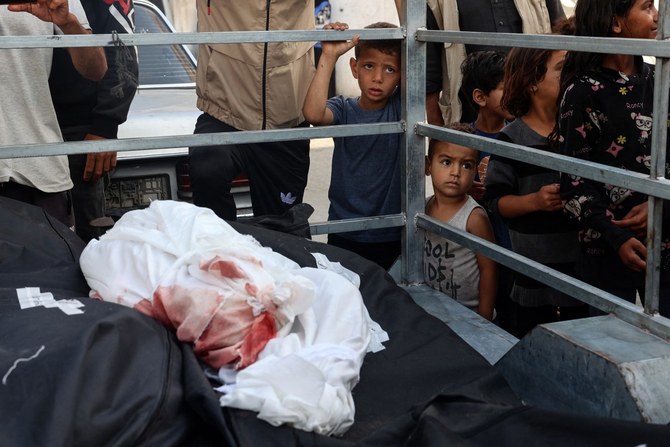
- The Atlantic’s writer Graeme Wood suggested that in certain scenarios killing of children can be legally justifiable
- Campaign group condemned the piece, calling the The Atlantic’s stance on the issue ‘egregious’
LONDON: The Atlantic has ignited a wave of online criticism after publishing an article arguing that “it is possible to kill children legally” in Gaza.
Titled “The UN’s Gaza Statistics Make No Sense,” the opinion piece by staff writer Graeme Wood questioned the accuracy of the UN’s civilian death toll numbers from the Israeli war on Gaza.
Wood suggested that the UN’s statistics were unreliable, claiming they are sourced from Hamas.
“The UN numbers changed because the UN has little idea how many children have been killed in Gaza, beyond ‘a lot.’ It gets its statistics from Hamas,” the piece read.
Wood, known for his skeptical stance toward Hamas and Palestine since the conflict erupted last October, controversially suggested that in certain scenarios, the killing of children can be legally justifiable.
Despite acknowledging that “even when conducted legally, war is ugly,” Wood argued, “It is possible to kill children legally, if for example one is being attacked by an enemy who hides behind them. But the sight of a legally killed child is no less disturbing than the sight of a murdered one,” he wrote.
The article sparked a significant online backlash, with the campaign group Writers Against the War on Gaza (WAWOG) condemning The Atlantic for the article.
“Eight months into the genocide and western media is still manufacturing consent for Zionism,” the group wrote in a post on X on Sunday.
“Defending child murder is egregious; but @TheAtlantic has historically defended imperial bloodshed,” WAWOG added.
@TheAtlantic published a justification for the murder of Palestinian children today. pic.twitter.com/CGTh3Aexxw
— Writers Against the War on Gaza (@wawog_now) May 26, 2024
Users took to social media to express their frustration over the article, with some questioning the legality of Wood’s claim and calling his choice of words “disgusting.”
“‘A legally killed child’ is a phrase I never imagined I would read in my lifetime,” wrote Lebanese political activist and musician Peter Daou on X.
"A legally killed child" is a phrase I never imagined I would read in my lifetime. https://t.co/8gPw9dAHF7
— Peter Daou (@peterdaou) May 26, 2024
Others have also called for canceling their subscriptions to The Atlantic.
The backlash comes as Israeli airstrikes killed at least 45 people on Sunday, hitting tents for displaced people in the southern Gaza city of Rafah, with reports that people were “burning alive.”
These attacks came two days after the International Court of Justice ordered Israel to end its military offensive in Rafah, described by the UNRWA as “horrifying.”
According to Gaza’s health ministry, the death toll in Gaza has neared 36,000 people, with the vast majority being children and women.
Bahrain’s youth rep taps into Kennedy with speech to Arab youth at Dubai media forum
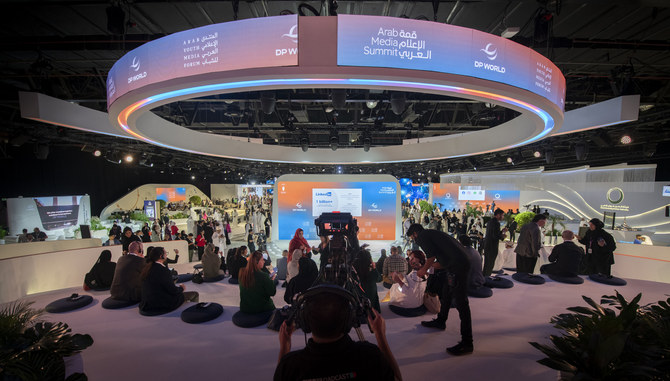
- Youth ‘can craft a better future for us all,’ says Sheikh Nasser Bin Hamad Al-Khalifa
- Praises Gulf leaders ‘who are focused on the next generation rather than the next election’
DUBAI: Sheikh Nasser Bin Hamad Al-Khalifa, Bahrain’s representative for humanitarian work and youth affairs, delivered a sharply defined message to Arab youth and their custodians.
In a speech at the Arab Media Summit, Al-Khalifa echoed the words of former US President John F. Kennedy, saying: “For a better world and a prosperous country, one must ask themselves what I can do for my country rather than what can my country do for me.
“The youth, which make up over 60 percent of our citizens today, is very different than previous generations. They have become the driving force behind certain industries and have taken to adopting certain causes that will craft a better future for us all.
“They are engaged in political and civil societies more than ever before throughout history. They have even managed to become successful in sectors such as journalism, social media in forms of content, podcasts and also showing sharp wit in investments and trade.”
Al-Khalifa, who served in a military academy, said he carries the academy’s message of “in order to serve, you must lead” throughout his life and policies.
“While challenges can occur, as it did during the COVID pandemic, which affected not only economies but personal lives as well, it was a lesson to be learned. We came out of it, and we are at a better place now.
“Challenges are opportunities. Some folk lost a lot during the pandemic, while others progressed, and the difference between the two is that one seized the opportunity to create and further themselves. while others remained still.”
On the subject of open borders and one being a “global citizen,” Al-Khalifa urged the youth and their elders to continue to strive, travel, experience and learn, but to maintain a “moral direction that connects and centers you to who you are: an Arab.”
He added: “We are an Arab ummah, and what does that mean? It is a legacy, it is victories, accomplishments, values that we have carried and learned from our forefathers that we continue to build on today. To take on Western concepts such as ‘global citizen,’ one can be lost. Our identity is Arab first and foremost.
“Our religion, Islam, urged us to read, learn and engage. And that is what we do with other countries as we both compete and cooperate with them.
“Know who you are and where your roots lie. Some societies have become fragmented due to their abandonment of their values. Nowadays, we have Westerners who are enrolling their children in our schools to keep them centered and away from social and moral confusion.
“While it is valid and important to ride the new wave in terms of technology and progress of open borders to make our countries better, I urge fathers and mothers to continue to stress on an upbringing that focuses identity and positive moral values.
“We want to invest in our youth. It is important that they feel seen, valued, trusted and supported and wanted. If we do that, then their stock will never plummet. They are half of our present and all of our future.”
He concluded his speech by saying how blessed the Gulf is to have leaders “who are focused on the next generation rather than the next election,” and offered a prayer to the lives lost in Gaza.
Arab Media Forum opens in Dubai with focus on youth
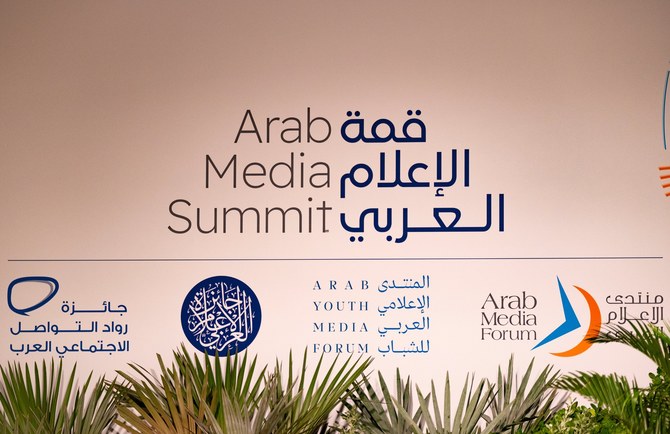
DUBAI: The annual Arab Media Forum launched in Dubai on Monday for a three-day summit involving media leaders and executives from across the region.
This year’s forum is geared toward youth, focusing on arming the next generation of journalists and media professionals with the tools and know-how to thrive in the ever-growing industry in the Arab world.
For the past two decades, the forum has brought together regional and international speakers to discuss the industry’s challenges and impact on Arab societies.
More than 1,000 creative and media students are expected to attend, along with prominent Arab personalities, content creators and global media industry leaders taking part in a range of panel discussions and master classes.
Notable speakers include Sheikh Nasser bin Hamad Al-Khalifa, the king’s representative for humanitarian work and youth affairs in Bahrain; and Dr. Sultan Al-Neyadi, the UAE’s minister of state for youth affairs.
Monday’s schedule includes master classes on Meta, tools for storytelling, interactive media, as well as building personal brands.
Panels and discussions on the opening day cover sports media, the art of directing and redefining storytelling.
Tuesday and Wednesday will feature discussions on key political, economic and technological developments by media personalities, editors in chief, writers and experts from the region and around the world.
The forum will close with an awards ceremony recognizing content creators and journalists in a range of categories.
Over 300 million children a year face sexual abuse online: study
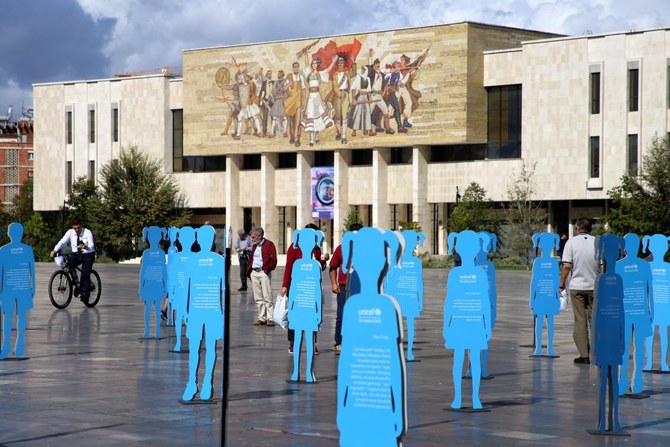
- One in eight of the world’s children have been victims of non-consensual taking, sharing and exposure to sexual images and video
- Grim trend on the rise with US worst offender, University of Edinburgh’s researchers says
LONDON: More than 300 million children a year are victims of online sexual exploitation and abuse, according to the first global estimate of the scale of the problem published on Monday.
Researchers at the University of Edinburgh found that one in eight of the world’s children have been victims of non-consensual taking, sharing and exposure to sexual images and video in the past 12 months.
That amounts to about 302 million young people, said the university’s Childlight Global Child Safety Institute, which carried out the study.
There have been a similar number of cases of solicitation, such as unwanted sexting and requests for sexual acts by adults and other youths, according to the report.
Offences range from so-called sextortion, where predators demand money from victims to keep images private, to the abuse of AI technology to create deepfake videos and pictures.
The problem is worldwide but the research suggests the United States is a particularly high-risk area, with one in nine men there admitting to online offending against children at some point.
“Child abuse material is so prevalent that files are on average reported to watchdog and policing organizations once every second,” said Childlight chief executive Paul Stanfield.
“This is a global health pandemic that has remained hidden for far too long. It occurs in every country, it’s growing exponentially, and it requires a global response,” he added.
The report comes after UK police warned last month about criminal gangs in West Africa and Southeast Asia targeting British teenagers in sextortion scams online.
Cases — particularly against teenage boys — are soaring worldwide, according to non-governmental organizations and police.
Britain’s National Crime Agency (NCA) issued an alert to hundreds of thousands of teachers telling them to be aware of the threat their pupils might face.
The scammers often pose as another young person, making contact on social media before moving to encrypted messaging apps and encouraging the victim to share intimate images.
They often make their blackmail demands within an hour of making contact and are motivated by extorting as much money as possible rather than sexual gratification, the NCA said.


